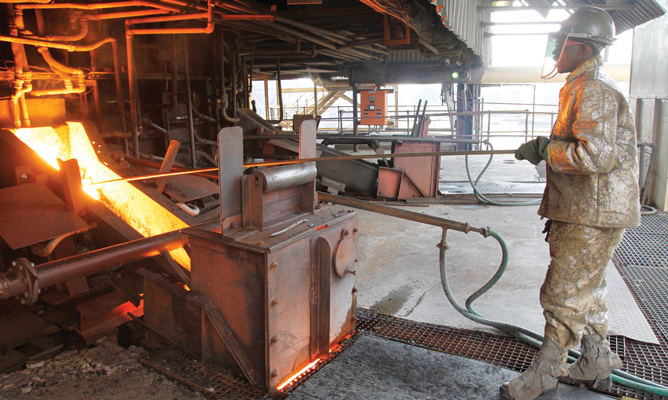
THE mining sector in Zimbabwe is in so much distress it needs urgent policy changes to enable the country’s mineral resources to have an impact on the economy, economists have said.
BY MTHANDAZO NYONI
The mining sector is reeling under many challenges, including falling global prices of minerals such as gold and platinum, excessive power outages, high electricity tariffs and lack of investment in the sector due to toxic indigenisation policies.

The mining industry, estimated to require up to $5 billion in fresh capital, has over the years failed to access funding for recapitalisation and new projects.
According to the Zimbabwe Chamber of Mines, the mining sector continues to operate below capacity as it faces several challenges, which include depressed metal prices, low capital and foreign direct investment inflows, high cost structures, sub-optimal royalties and power shortages.
Analysts contacted by Standardbusiness said government needed to pay more attention to the welfare of the mining sector to save itself from total collapse.
They warned that failure to do that, the industry was going to die in the manner the cotton industry fell.
- Chamisa under fire over US$120K donation
- Mavhunga puts DeMbare into Chibuku quarterfinals
- Pension funds bet on Cabora Bassa oilfields
- Councils defy govt fire tender directive
Keep Reading
Renowned economic analyst John Robertson said Zimbabwe had been affected by falling prices just as had happened in other countries that were dependent on commodity exports.
He said since Zimbabwe had no control over the currency it was using, it’s only option was to reduce costs and increase efficiency to become competitive again.
“Cost reductions are taking place, but too slowly to counter the increasing dependency on imports and, for the mining sector, too slowly to make up for the falls in world prices,” he said.
Robertson said new mines can start with more efficient mining methods, but the investors who could build them were being discouraged by the obtaining indigenisation policies.
“These policies state that investors will not be permitted any return at all on 51% of their investment, which means that the effective tax rate on this percentage is 100%, and that they will have to pay 25% tax on the earnings of the 49% balance,” he said.
“On top of these are royalties, licence fees and land re-registration fees.
“The total effective tax on the 100% investment required therefore comes to about 85%.
“No new big mines can start under these arrangements and many of the existing mines will close,” Robertson added.
He said to save the mining industry from collapse, the Indigenisation Act should be repealed and government must concentrate on creating policies that bring about recovery and job creation.
“Other countries need our minerals, but we need employment and government needs the tax revenues.
“All of these can only improve when investors are encouraged by supportive policies. At present, Zimbabwe’s investment policies are perhaps the worst on earth,” he added. National Mine Workers’ Union of Zimbabwe president Enoch Sithole concurred, saying government should act swiftly to repeal regulations hindering the sector from growth.
Efforts to get comment from Mines minister Walter Chidhakwa on the future of the mining industry and mitigations put in place by the government were fruitless last week as his mobile phone went unanswered.
Another analyst Godfrey Kanyenze said there was need for the government to work on infrastructural development like revamping railway lines.
He also said the issue of beneficiation should be pursued as that would add value into the country’s mineral commodities.
“The government and players in the mining sector should address issues of human capital as well as dealing with energy issues,” he said.
“You can’t run a mine with a generator. The government should also address the issue of economic diversity, because at the moment we are in structural regression. So we should arrest structural regression and initiate structural transformation.”
Kanyenze said the future of the mining industry lay on the initiatives that government would take from now.
“In the next five years, if we do business as usual then we are finished,” he said.
Robertson’s sentiments come after listed resources group, Falcon Gold indicated that it could close operations permanently, because of viability problems spurred by weak commodity prices on the global market.
Imviga Gold Mine Group has also reportedly ceased operations in Matabeleland North and sent its entire 500-strong workforce on unpaid leave, citing tough operational challenges.
Mining companies such as Old Nic and Carry Mine are not operating.
The mining sector has been the backbone of the economy since 2009 when the country introduced the multi-currency system.
In 2009, the sector recorded a total of $671,5 million from all minerals, growing to $1,4 billion in 2010.
In 2011, the total value stood at $2 billion before going down to $1,9 billion in 2012.
In 2013, the total value of mineral sales was $1,97 billion and the sector contributed about 65,2% of export earnings.











